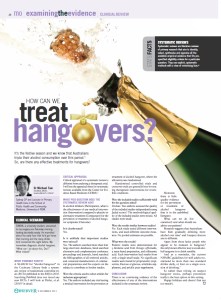The following is a comment to an opinion piece, “Tarring complementary medicine is anti-choice” written by Kerryn Phelps in Medical Observer. My comments were published online on 21 March 2012. I concur with some of the statements in the comments and feel I must support my colleagues who are members of the Friends of Science in …
Tag: EBM
Mar 15 2012
Comment: Homoeopathy, ethics and controversy
Comment to the article “Homeopathy isn’t unethical, it’s just controversial” by Jon Wardle, published in The Conversation. To be frank, it is really quite simple. Homoeopathy isn’t “controversial”. It does not work. There is no good empiric evidence that it does, plenty of empiric evidence that it doesn’t, and entirely lacks scientific plausibility. There is a …
Jan 15 2012
Twitter: Magical thinking, faith healing
Twitter: Magical thinking is harmful – Faith Healing: Quackery, Fraud, and Murder: http://www.skepticalhealth.com/2012/01/14/fai … #health
Dec 09 2011
How can we treat hangovers?
This article was published in Medical Observer. The article is also available on the Medical Observer website (may need registration).
Dec 05 2011
Is it ethical for medical practitioners to prescribe alternative and complementary treatments that may lack an evidence base?
Tam CWM. Is it ethical for medical practitioners to prescribe alternative and complementary treatments that may lack an evidence base? [Letter] Med J Aust 2011; 195(11): 660-661 This was a Letter to the Editor published in the Medical Journal of Australia. DOI: 10.5694/mja11.11333 The article is in PDF format and hosted by Google Drive.


Mar 23 2012
Comment: EBM vs CAM
Comment to the article, “Evidence-based medicine v alternative therapies: moving beyond virulence” by Kerreen Reiger, published in The Conversation: Health claims are empiric claims. They can be tested using empiric methods. Scientific frameworks allow use to gauge the reliability of evidence. For example, the narrative claim from an individual that they were helped by chiropractic is …
Continue reading